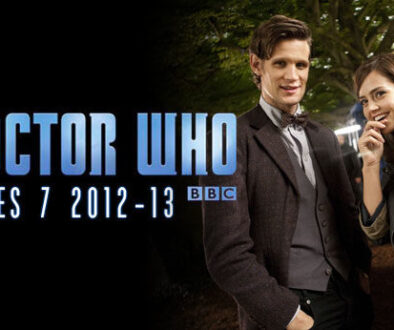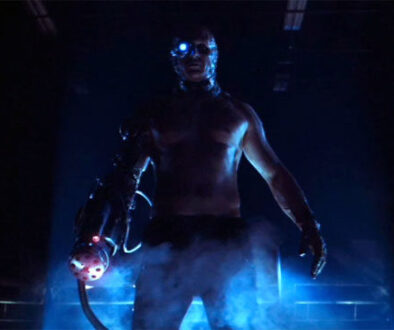2nd Opinion: The Power of Three
John Hussey and Adam James Cuthbert each give their own take on the 4th episode of Series 7.
John’s verdict

Chris Chibnall returns with another delightful and fun-packed story for the gang and during the penultimate episode of Series 7: Part 1, we see the Ponds receiving their last major character development before their final outing next week.
I can honestly say ‘The Power of Three’ is Amy and Rory’s story. It’s one final attempt to show off their brilliant characters before their dark and emotional exit next week. It’s certainly done in an interesting and unique way. The slow invasion plot really does allow for time to play a huge part on how the Ponds deal with real life and life onboard the TARDIS. Their journey has taken many different formats, from being a regular bunch of companions leaving their old life behind to now being one off companions which the Doctor comes back for every now and again. It’s a companion relationship that hasn’t been seen before and it really shows in Chibnall’s second story of the series how it works and how it conflicts with their normal lives. I wouldn’t say it conflicts their lives physically, more mentally and how the Ponds see the world and how they deal with facing their two realities. It’s almost like a massive dilemma: which life does one choose?
Also to help with the final developments of the Ponds, we have the return of Brian Williams. This time round though he asks the parent questions of what will happen to his child (like Jackie and Francine before him). During that slight emotional scene of Brian’s questioning, we see the Doctor point out once again that his life is dangerous and some of his closest friends pay the price for his wild and out of control lifestyle which he drags them into. This was a nice little reference to companions Katarina and Adric (to name a few). Also the Doctor’s line in saying this fate won’t happen to Amy and Rory echoes back to what he told Rose in ‘School Reunion’ in which he says he would never abandon her, but she would later become trapped in a parallel world, against his promise. When I watched that scene it just showed me that in ‘The Angels Take Manhattan’ the Ponds will meet a dark end, and in my eyes this fate points to death.
One of the brilliant parts of the story was the Doctor having to yet again live an ordinary and boring life, as seen in recent years within ‘The Lodger’ and ‘Closing Time’. The fact he goes into a child-like state after spending four days sitting doing nothing reflects to the idea that the Doctor can’t remain still and this is why he travels. Also to me, it reflects the fact that he is actually the Ponds son-in-law and they have to try and control their tantrum child and keep him amused, which is almost how Amy reacts to his child-like moaning session. The whole montage of him keeping himself amused was just really funny, but then it lead to a very serious Doctor in which it shows how much he depends on the company of others. He wants Amy and Rory to leave with him and can’t understand why they would turn down the universe and all its glory. This is again brought up in his conversation with Amy outside the Tower of London. It’s all there to reference why the Doctor ran away from Gallifrey in his stolen TARDIS; because he was bored and wanted more than an ordinary life of staying in one place and time.

The other great thing about the episode was the return of the Unified Intelligence Taskforce (U.N.I.T.). They have been one of my favourite concepts since I was a child and it was nice to see them return in their old glory. The introduction of the wonderful Kate Stewart was a great addition to the story, especially because of her relationship to the show within her name. She is the daughter of one of the greatest and most loved characters within Doctor Who’s long history; Brigadier Lethbridge-Stewart. I love how Chibnall was allowed to continue his legacy through his daughter after his death was revealed last year in ‘The Wedding of River Song’. Those scenes where the Doctor and Kate mention him nearly made me cry. In fact tears did come out of my eyes. Having said that, I was slightly disappointed there weren’t any more references. I was hoping for perhaps a visit to his grave or maybe the Doctor wondering into his old office and picking up an old photograph followed by a montage of his old friend. Also I felt in some ways U.N.I.T. wasn’t in it much and didn’t really do anything in terms of action. I think they concentrated too much on the scientific side and not enough on the military side (even though it was the reverse problem during RTDs era). But I do hope Kate becomes a reoccurring character and that it slowly becomes the Doctor’s duty to look out for her as a sort of debt to his late friend, due to not visiting the Brig in hospital during his last months.
Now onto the Cubes. They were interesting to say the least but their greater design within The Shakri’s plans of completing the mysterious Tally, which speaks of killing Humanity before they spread across the stars, was unfortunately rushed. The Shakri weren’t explained in great detail due to their lack of screen time. All we know of them really is that they were a dark tale told to the children of Gallifrey to help keep them in order. Beyond that, all we can hope for is their return sometime in the future.
‘The Power of Three’ was a great episode but unfortunately due to its abrupt ending, it will always in my eyes remain the episode that could have been better. The story behind the Ponds was great but as for the rest of the story; it was too rushed. Also what where those nurse things? They weren’t explained, nor were their experiments explained. They were completely pointless. There was too much story crammed into 45 minutes and the end result justified this with a weak resolution which seemed far too convenient for my own tastes. And as I said above, there wasn’t even much time for a good old-fashioned U.N.I.T. plot and I felt their great return was slightly pushed to the side. Ideally, this kind of story needed a two-parter. Plain and simple.
I now look forward to the mid-series finale, in which the Ponds meet their dark and emotional fate at the hands of the Weeping Angels in the city that never sleeps. I can’t help but think that Brian may have sent them to their dooms.
Adam’s verdict

I’m probably in the minority when I say Amy and Rory have overstayed their welcome. However, my opinion has certainly fluctuated on the matter, as while their presence was superfluous in Asylum, both Dinosaurs and Mercy justified their extended stay in one way or another. (It’s also brought to my attention only one companion is a necessity.)
The Power of Three was an opportunity to highlight the Williams’ post-Doctor life, further developing the changes the characters have experienced since, as illustrated in Dinosaurs. The Power of Three, arguably, would have been better suited to a ‘Doctor-lite’ premise, where, in this case, the companions established a working relationship with UNIT, encountering others who had been inspired by the Doctor. The Doctor himself could have been a background presence: either reserved for flashbacks as Amy and Rory recount their erstwhile adventures with the Doctor, or even phone-calls from the TARDIS, informing the Williams he’s looking of them but without directly engaging himself in their life, displaying a maturity of character lacking within the story itself. This would have created dramatic tension by echoing earlier themes that if the Doctor continues to interfere in their life ultimately a tragic ending will follow.
I’ve contemplated that one facet missing from this series is an continuation of the themes explored in The God Complex, namely Amy and the Doctor perceiving one another through the ‘looking-glass’ of how their relationship was formerly reflected (e.g. the Doctor referring to them as the Williams, showing a maturity within their relationship). This would have strengthened the series, thematically, as a whole.
I find it puzzling that there wasn’t even a brief discussion of the Doctor developing into a darker character here. While the story emphasised the Doctor’s loneliness and his attachment to Amy, stemming from the aftereffects of his regeneration (I actually enjoyed the idea of the Doctor being ‘imprinted’ onto Amy; however, it doesn’t help the Doctor behaves more like a child than the responsible adult he should be), the past two stories explored it to greater effect, whilst connecting with the motif of the Doctor’s darker side. I think had the story largely replaced the focus on the Doctor with the Williams cooperating with UNIT to resolve an alien threat, it would have been one of the highlights of this series.
As it is, UNIT’s reintroduction was weak: a means to an end, without demonstrating the organisation to be capable of protecting the planet alone. I was pleased by Jemma Redgrave’s performance as Kate Stewart and felt her character deserved an episode of her own, perhaps fleshing out her character in detail and the extent to which she inherited her father’s spirit, nobility, and admiration of the Doctor’s morals.

Fortunately, Mark Williams had the opportunity to shine this time, giving an understated performance as Rory’s father, Brian. The scene where he confronts the Doctor about his past relationship with companions at least brought a maturity and poignancy to the Doctor’s character. I will be chagrined if Brian isn’t informed of the Williams’ fate in the possible event of their deaths. Certainly, Brian’s decision to let Amy and Rory resume their travels with the Doctor should garner respect from the Doctor himself. I believe it would be inappropriate for the Doctor not to share the news with Brian; after all, the Doctor owes him.
The plot itself was incoherent and suffered from a number of plot holes (what was the purpose of the alien nurses; why were they abducting hospital patients; why didn’t the little girl draw attention to herself; if the nurses were working for the Shakri, why did the Shakri abduct humans in the first place, considering humans are a ‘pest’ to be exterminated; were the people on the ship actually alive when the ship blew up?) that affected my ability to enjoy the episode. Though the Shakri was a clever idea and the invasion was novel in its execution, the plot also suffered from a disappointing and anticlimactic resolution.
In conclusion, The Power of Three was a wasted opportunity. I’m also concerned that having no two-part episodes will retrospectively be detrimental to subsequent stories that needed the extra time to develop their themes and ideas in greater depth, as was the case with The Power of Three. By doing so, the story could have successfully gauged the creative balance between the Doctor’s broader influence (on Amy and Rory, UNIT, etc.), the Doctor’s sense of loneliness, becoming a darker character, and the alien threat itself.
You can read more of Adam’s thoughts at Cult Fix.







